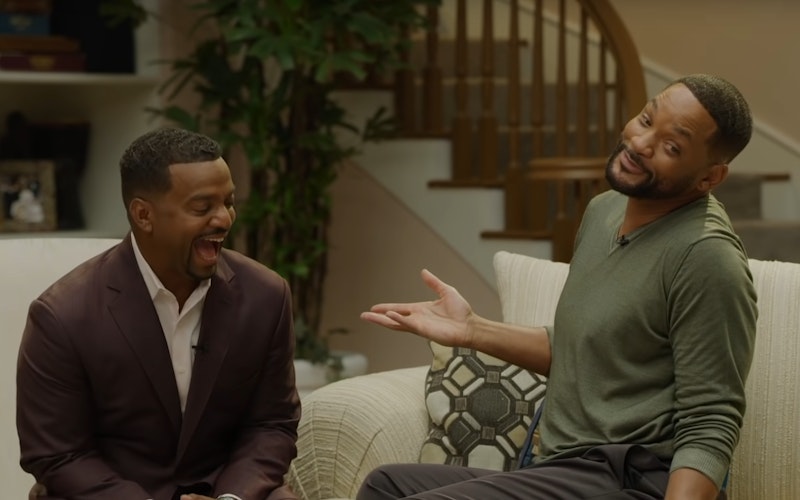
TV
Family and Forgiveness on the Fresh Prince Reunion
On HBO Max’s recent Fresh Prince of Bel-Air Reunion, Will Smith and his television family laugh and reminisce on the set of their “childhood home” before Smith interrupts the fun. “So, as a family,” he says hesitantly, “we have our things that we talk about, and then we have things that we don’t talk about.” And there are some things that have taken nearly 30 years to be said.
The Fresh Prince of Bel-Air remains one the most recognized and beloved family sitcoms of all time. And The Fresh Prince of Bel-Air Reunion serves up the feel-good nostalgia that we could all use right now. But the real draw is the unexpected detente between Smith and former costar Janet Hubert, who portrayed Aunt Viv in the series. After years of bad blood, their reconciliation is a testament to the power of forgiveness, including what it can offer both the transgressor and the transgressed.
Hubert left the series at the height of its popularity. (Her role was recast with the talented Daphne Reid, who delivered a notably milder performance.) In the years since, Hubert has publicly accused Smith of selfishness and of using his clout to drive a wedge between her and the show’s producers. Smith has, in the past, accused Hubert of disrespect and of harboring a bad attitude on set; he once claimed in a radio interview that she “straight up ... wanted the show to [become] The Aunt Viv of Bel-Air.” Before the reunion, the two hadn’t spoken since 1993.
At the Reunion, Hubert sets the record straight: about why she withdrew from her fellow castmates; why she left the show (“I was never fired”); and what this has all done to her career. “I lost everything,” she tells Smith in a one-on-one sitdown. “Reputation. Everything … You know those words. Calling a Black woman ‘difficult’ in Hollywood is the kiss of death.” For his part, Smith admits that he “made the set very difficult” for Hubert (“I wasn’t sensitive, I wasn’t perceptive”) and apologizes for his past mistakes. Hubert offers her own mea culpa for the “hateful things” she's said about him, before the two fall into a forgiving embrace, both declaring, “We’re good.”
The real draw is the unexpected detente between Will Smith and former costar Janet Hubert
As people of faith, we are called to offer forgiveness to those who’ve wronged us. “If you forgive other people when they sin against you,” the Bible reads, “your heavenly Father will also forgive you.” It’s easy to read this relationship between God’s forgiveness and our own as a direct transaction—a deal, a quid pro quo. Yes, our forgiveness is a condition of our faith, but that doesn’t render God’s forgiveness conditional. Indeed, his unyielding mercy is the example on which we ought to model our own. We are encouraged to be done with the bitterness and slander and rather “be kind and compassionate to one another, forgiving each other, just as in Christ God forgave you.” To know God is to follow his example. Conversely, it’s only when we’re able to forgive others unconditionally that we can conceive of a God who bestows such forgiveness upon us.
That is not to say that forgiveness comes easily. It can be especially complicated in cases of oppression or abuse. Often we need to sever destructive relationships or distance ourselves from a toxic environment before we’re even able to confront a transgressor, let alone accept their apology. After 27 years, Hubert says in Reunion, “it was time.” And while she calls her exchange with Smith “healing,” she needed to heal on her own, first, before including Smith in that process. Even then, she absolves neither Smith nor the system that enabled his behavior all those years ago. Forgiveness, after all, demands accountability.
For his part, Smith admits that he “didn’t want to be that guy” who promotes “understanding and human relationships” in public without acknowledging the hurt he caused his costar. Their reconciliation feels so cathartic because both sides offer apologies met with genuine remorse and repentance. “The person I want to be is someone who protects you,” he tells Hubert, explaining his growth since the days of Fresh Prince.
At its heart, that’s what The Fresh Prince of Bel-Air Reunion is about: growth. While watching old audition tapes, the cast heckles their younger selves, questioning the choices they made. Early episode clips reveal a novice Smith blatantly mouthing the dialogue of his scene partners, having memorized the whole script in order to learn his lines. The “kids” relay how their time on the show taught them how to be real actors, especially under the guidance of the late James Avery, who played Uncle Phil. Through teary eyes, Smith recalls filming one challenging, emotional scene with Avery. After flubbing his line, a visibly upset Smith needed the veteran’s command and steady hand to refocus; he needed forgiveness and the permission to do better. The result remains one of Will Smith's most memorable onscreen moments and proof of his capacity to grow.
That’s what happens when we forgive someone: we accept that they are just as prone to mistakes, capable of change, and as worthy of God’s mercy as the rest of us.
Topics: TV